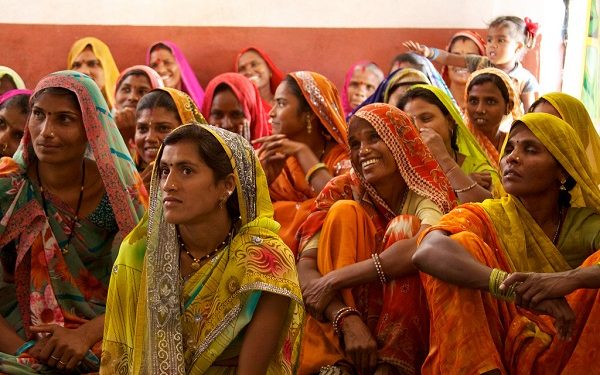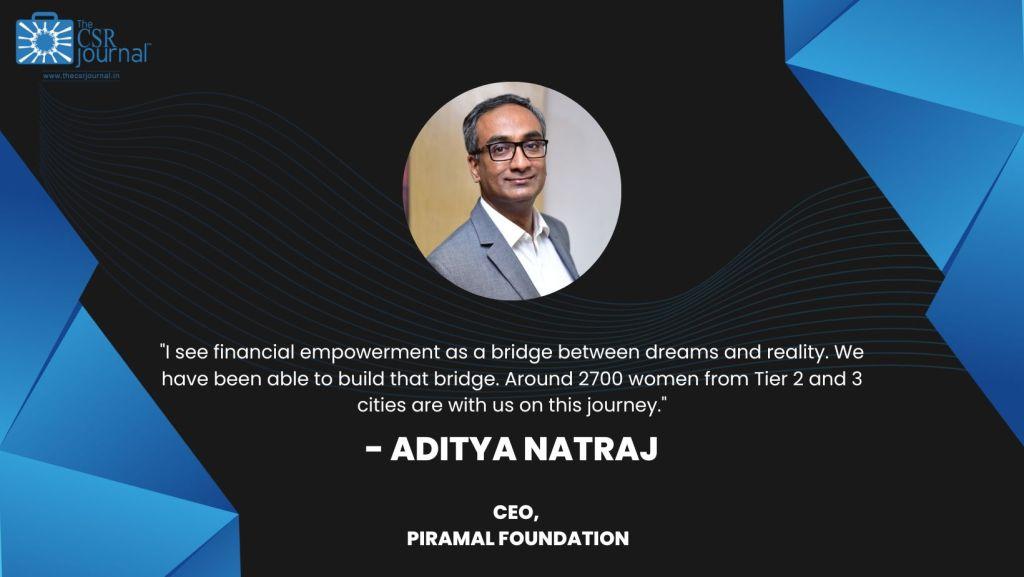Piramal Foundation, the philanthropic arm of Piramal Group is working towards improving the lives of marginalised communities, by leveraging the power of youth and strengthening Government systems. It works in collaboration with the Central Government and State Government, international and national organizations and academia to accelerate change in India. The Foundation claims that it has touched the lives of 11.3 crore Indians in the last 16 years.
What is Piramal Foundation’s focus in the area of Corporate Social Responsibility for this year and the ongoing financial year? What is Piramal Foundation doing to empower rural women and tribal communities in India? Mr. Aditya Natraj, CEO of Piramal Foundation shares details in an exclusive interview with The CSR Journal.
1. Which areas or sectors will Piramal Foundation focus its CSR in 2024?
Since we started 16 years ago, Piramal Foundation has been committed to keeping the most marginalised at the centre of what we do. In order to serve these communities (25% of India’s population) we will address the most intractable social challenges that are impeding progress, and design and implement solutions that will accelerate change and enable transformation at scale.
Our attention on public systems change over the last many years remains at the forefront. We will continue to work with government leaders, inspiring in them a spirit to serve, i.e. ‘Sewa Bhaav’, leading to improved service delivery. This we are further strengthening through digitization.
In order to bring about large-scale behaviour change, we will strengthen the ability of communities to own and lead hyper-local change. For this, we are collaborating with hyper local entities like NGOs, colleges, SHGs, media, faith healers, and Panchayats.
All of this will be served through our 4 large programmes which we call our Big Bets – collaborative platforms designed to strengthen systems and solve social problems at scale by leveraging technology, engaging communities and working with governments.
Underlying all these efforts is our belief that youth and women can be catalysts of change. By harnessing the power of youth and women we will continue to not only enable ground up change but to build future leaders engaged in nation building.
2. What is Piramal Foundation doing to financially empower women in rural areas?
I see financial empowerment as a bridge between dreams and reality. We have been able to build that bridge. Around 2700 women from Tier 2 and 3 cities are with us on this journey.
The Karuna Fellowship programme is a commitment we have taken to nurture the soul of Bharat through the hands of these resilient women. The Fellowship encourages aspiring women from socio-economically disadvantaged backgrounds to embrace and develop their abilities by providing them with technology and other employable skills, e.g.-leadership & livelihood skills. The programme is designed to build a network of financially independent, tech-savvy, future-ready and compassionate women who embark on the road to nation building.

3. What challenges have you faced while implementing programmes in rural areas and how do you address the same?
Trust deficit: Rural communities are often sceptical about external interventions. What we try is community-based participatory approaches to get closer to their needs and involve them in programme implementation.
Cultural and traditional barriers: Deep-rooted social norms and practices hinder programme effectiveness, for which we adopt a sensitive and inclusive approach, working with community leaders and religious institutions to bridge cultural gaps and make ourselves acceptable.
Lack of awareness: Communities have limited access and limited agency which leads to lack of awareness about existing government schemes. Our role as a foundation is to empower communities with the knowledge and agency to access existing resources, schemes and policies.
Infrastructure and resource gaps: Lack of proper infrastructure (roads, electricity, communication networks) and limited access to skilled personnel can constrain creating impact. We create forums, bringing different government line departments together on one platform for maximising utilisation of existing resources, filling in gaps and enabling last mile convergence.
4. The Government of India is focusing on the importance of skill training in various sectors. How necessary is skill training in today’s time especially to make the youth job ready? Please share your opinion.
India has the highest youth population in the world, with 808 million people under the age of 35 or 66 percent of the total population. We must take work-skills training seriously.
We have culturally respected and invested significantly in tertiary education. Getting a professional degree is considered a mark of ultimate success. But this cannot be at the cost of the majority of our young people who are in secondary education and will not have a shot at it.
The government is mainly focused on getting primary education right. Even in the development sector, most of us are still focused on ensuring that all children develop the necessary foundational and primary skills. Unfortunately, given that we have only about two decades left to harness the opportunity of a working population, we don’t have the luxury of doing primary first and then looking at secondary. It needs to happen simultaneously, and it needs to happen now.

Findings state that the labour participation rate has declined from 46% in 2017 to 40% in 2022. At this stage, prioritising vocational education will help in nurturing a culture that respects diverse skillsets.
We need to invest in school-to-work transitions seriously and develop a robust curriculum that is future-of-work focussed. We need to hire and train teachers for effective implementation, allocate budgets, and provide for internships and apprenticeships. Also, we need to ensure market linkages and employment opportunities. Without this, we are not going to be able to move forward and make the next two decades matter for our youth.
5. Please tell us about the upcoming Piramal School of Leadership in Jaipur, Rajasthan where more than 1.50 lakh government officials will be skill trained annually.
India has nearly 30 million public officials. But there’s a significant dearth of institutions with the capacity for technical, professional, and personal development. We aim to address this gap by focusing on mid-level government leadership to catalyse a paradigm shift in government departments and create transformative impact on service delivery.
Since the last 10 years, a smaller programme of Piramal School of Leadership in Bagar, Rajasthan has been catering to 100-150 participants. The overwhelming demand from state governments prompted our Chairman to dedicate a 10x facility rooted in ‘personal transformation leads system transformation’.
Spanning across 32 acres, the Piramal School of Leadership Jaipur will be a unique, grounded, and aspirational learning space. It will offer unexpected and interactive areas, fostering self-reflection and transformative experiences. The school will commence operations in December 2025. Its primary target will be government sector middle managers and senior leaders to enhance service delivery and drive systemic transformation.
In Piramal School of Leadership we are aiming to create a landmark institution, annually accommodating 50,000 officials, with a capacity to host up to 150,000 for holistic training across domains. It will house five schools under its umbrella, aligned to Government initiatives & development needs:
i. School of Education and Systems Change
ii. School of Climate and Sustainability
iii. School of Health
iv. School of Justice
v. School of Inclusion
6. Please tell us about Anamaya, the Tribal Health Collaborative which is aimed at providing healthcare to tribal communities in India and the Digital Bharat Collaborative.
These are two of our four Big Bets. At the heart of Anamaya’s journey is a compelling need to address the health disparities that have long affected tribal communities across India. From the start, our vision was to uplift the poor state of health of Tribal people, who are very susceptible to diseases. Of course, that was an ambitious vision, as we are targeting health outcomes of 10.4 crore tribal people! Owing to India’s commitment to achieving the SDGs 2 and 3 goals by 2030, we had to operate as a multi-stakeholder collaborative. Our focus through this collaborative is to eradicate preventable deaths within the tribal and marginalised community.

Digital Bharat Collaborative is all about creating a robust digital backbone to strengthen public systems — simplifying processes, improving transparency, and handing more power to people. We want to create a nation where every citizen has equal opportunities and can get quality public services.
Teaming up with State IT Programme Management Unit, we are bringing tech experts on board who can sketch out a roadmap to redefine digital readiness while ensuring seamless continuum of care. Parallelly, we are employing a digital approach to re-engineer processes, enable improved technology in order to build system and tech readiness. Additionally, we are setting-up data-based governance structures to support the state in improved governance and decision making.
By building state capacity, empowering communities and leveraging digital technology, we envision an India where every citizen enjoys equitable access to quality public service and equal opportunity.
Ahana Bhattacharya can be reached at ahana@thecsrjournal.in


